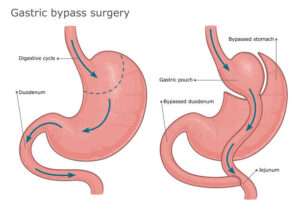Welcome to another blog post of wikilifestyles.com
Introduction: Everything You Need to Know About Bariatric Surgery
Bariatric surgery, also known as weight loss surgery, is a surgical procedure that helps individuals struggling with obesity to lose weight and improve their health. With increasing rates of obesity in India, bariatric surgery has become a popular option for those looking to achieve sustainable weight loss. In this blog post , we will cover everything you need to know about bariatric surgery, including the procedure, cost, risks, benefits, types, diet, eligibility, recovery, surgeons, and results, with a focus on the Indian perspective.
The Procedure: Bariatric surgery

What to Expect During Bariatric Surgery Bariatric surgery involves the alteration of the digestive system to reduce the amount of food that can be consumed and absorbed. Sleeve gastrectomy, gastric bypass, and gastric banding are the most prevalent types of bariatric surgery. The procedure typically lasts between 1-3 hours and is performed under general anesthesia. During the surgery, the surgeon will create small incisions in the abdomen and use laparoscopic instruments to remove a portion of the stomach or create a smaller stomach pouch. Patients can expect to stay in the hospital for 1-3 days after the surgery.
Cost of Bariatric surgery

How to Pay for Bariatric Surgery The cost of bariatric surgery in India can range from Rs. 2-6 lakhs, depending on the type of surgery and hospital. While insurance coverage for bariatric surgery is limited, some insurance companies may cover the procedure for individuals who meet specific criteria. Financing options, such as medical loans or payment plans, may also be available.
Please refer this article to know more
Risks Related to Bariatric surgery
Understanding the Risks of Bariatric Surgery As with any surgical procedure, there are risks and complications associated with bariatric surgery. Some potential risks include bleeding, infection, blood clots, and adverse reactions to anesthesia. In addition, bariatric surgery can lead to long-term nutritional deficiencies and changes in bowel habits. However, these risks can be minimized by choosing a qualified and experienced surgeon and following the post-surgery guidelines.

Benefits of Bariatric surgery:
The Benefits of Bariatric Surgery for Weight Loss Bariatric surgery has been shown to be an effective long-term weight loss solution for individuals with obesity. Bariatric surgery can treat or resolve obesity-related health issues such as diabetes, high blood pressure, and sleep apnea in addition to weight loss. Patients often report improved quality of life and increased confidence and self-esteem.
Types: Different Types of Bariatric Surgery Explained:
As mentioned earlier, there are three main types of bariatric surgery: Sleeve gastrectomy, Gastric bypass, and Gastric banding. Sleeve gastrectomy involves removing a portion of the stomach to create a smaller stomach pouch, while gastric bypass involves rerouting the small intestine to a small stomach pouch an adjustable band is wrapped around the upper portion of the stomach during gastric banding to create a smaller stomach pouch. Each type of surgery has its own benefits and risks, and the best option for an individual will depend on their specific health needs and goals.
Post-Bariatric Surgery Diet:
What You Need to Know Following bariatric surgery, it is essential to follow a specific diet to ensure long-term success and prevent complications. The diet typically involves consuming small and frequent meals consisting of protein-rich foods and avoiding high-calorie and high-fat foods. Patients should also avoid drinking liquids with meals and prioritize hydration throughout the day.

Eligibility: Are You Eligible for Bariatric Surgery?
To be eligible for bariatric surgery, an individual must have a body mass index (BMI) of 40 or above, or a BMI of 35 or above with obesity-related health conditions. Other factors, such as age, overall health, and willingness to make lifestyle changes, will also be considered.
Video Courtesy: YouTube
Bariatric Surgery Recovery, What to Expect After bariatric surgery:
it is crucial to follow a strict diet and exercise regimen. The first few weeks following the surgery, patients may experience discomfort and pain as their body adjusts to the changes. The recovery time for bariatric surgery varies depending on the type of surgery and the individual’s health condition. However, patients can expect to return to normal activities within two to four weeks. It is essential to follow your surgeon’s guidelines and attend follow-up appointments to ensure a successful and healthy recovery.
Finding the Right Bariatric Surgeon for You:

Choosing the right bariatric surgeon is crucial for the success of your surgery. It is essential to research and find a surgeon who has experience performing bariatric surgeries and a good track record of successful outcomes. You can start by asking for referrals from your primary care physician or other medical professionals. Additionally, make sure to check the surgeon’s credentials and certifications, such as being board-certified in bariatric surgery. Consult with multiple surgeons before making a final decision to ensure that you are comfortable with their approach and feel confident in their ability to perform the surgery.
Click here to find out the best bariatric surgeons in India
The Realistic Results of Bariatric Surgery:
Bariatric surgery has been shown to be an effective tool for significant weight loss and improved health outcomes in obese individuals. On average, patients can expect to lose between 60-80% of their excess weight within the first year following surgery. Additionally, bariatric surgery has been linked to improved conditions such as type 2 diabetes, high blood pressure, and sleep apnea. However, it is important to note that surgery alone is not a magic solution, and patients must follow a strict diet and exercise regimen to maintain long-term weight loss success.

Conclusion :Everything You Need to Know About Bariatric Surgery:
For people with obesity, bariatric surgery can be a game-changing procedure. It is important to understand the recovery process, find the right surgeon, and have realistic expectations for the results. With proper care and adherence to post-surgery guidelines, patients can achieve significant weight loss and improve their overall health and quality of life.
FAQ:
Q: What is bariatric surgery?
A: Answer: Bariatric surgery is a surgical procedure that helps individuals with severe obesity achieve significant weight loss by modifying the digestive system.
Q: What are the common types of bariatric surgery?
A: The most common types of bariatric surgery include gastric bypass, sleeve gastrectomy, and adjustable gastric banding.
Q: Will I experience pain after surgery?
A: It is common to experience pain and discomfort in the first few weeks following surgery. However, your surgeon will prescribe medication to manage pain and ensure a comfortable recovery.
Q: How long does it take to recover from bariatric surgery?
A: The recovery time varies depending on the type of surgery and the individual’s health condition. However, patients can expect to return to normal activities within two to four weeks.
Q: Will insurance cover the cost of bariatric surgery?
A: In some cases, insurance may cover the cost of bariatric surgery. It is best to check with your insurance provider and discuss the options with your surgeon.
Q: Who is a good candidate for bariatric surgery?
A: Candidates for bariatric surgery typically have a body mass index (BMI) of 40 or higher, or a BMI of 35 or higher with other obesity-related health conditions, such as type 2 diabetes or high blood pressure.
Q: What are the potential risks and complications of bariatric surgery?
A: While bariatric surgery is generally considered safe, potential risks and complications can include bleeding, infection, blood clots, and nutritional deficiencies.
Q: How much weight can I expect to lose after bariatric surgery?
A: Weight loss results can vary depending on the individual and the specific procedure, but most people can expect to lose a significant amount of weight in the first year after surgery.
Q: What is the recovery process like after bariatric surgery?
A: The recovery process after bariatric surgery typically involves a period of rest and healing, followed by a gradual return to normal activities and a focus on healthy eating and exercise habits.
